Overview
Introduction: What to Feed a Dog with Diarrhea

As devoted dog owners, we revel in the joy of wagging tails and the delightful spectacle of playful antics. However, when our furry companions encounter tummy troubles, especially the discomfort of diarrhea, it becomes a cause for genuine concern.
This comprehensive guide, including insights on what to feed a dog with diarrhea, is designed to navigate the intricacies of a dog’s upset stomach, shedding light on the pivotal role of a balanced diet in maintaining optimal canine health.
Identifying Causes of Dog Diarrhea
Dietary Indiscretions
Dog diarrhea is often linked to dietary indiscretions when dogs ingest inappropriate or unfamiliar substances. This may include scavenging garbage or consuming spoiled food. If your dog experiences occasional diarrhea, consider recent dietary changes or possible indiscretions.
Monitoring their food access and maintaining a consistent diet can help prevent issues. While most cases resolve on their own, persistent problems require veterinary attention for a thorough evaluation and to ensure your pet’s well-being.
Food Allergies and Sensitivities
Identifying the causes of dog diarrhea frequently points to food allergies and sensitivities. Dogs, like humans, can develop adverse reactions to certain ingredients in their diet, leading to gastrointestinal issues such as diarrhea. If your canine companion experiences recurrent or persistent diarrhea, it’s crucial to consider potential food-related triggers.
A process of elimination, under the guidance of a veterinarian, can help identify and manage these allergies, ensuring your dog enjoys a balanced and irritation-free diet. Regular awareness of dietary changes and prompt veterinary consultation contribute to your pet’s digestive well-being.

Bacterial or Parasitic Infections
Dog diarrhea is often caused by bacterial or parasitic infections disrupting the digestive system. Common culprits include Salmonella or parasites like Giardia. If your dog has persistent diarrhea with symptoms like lethargy, dehydration, consider these infections. A vet can diagnose and treat, ensuring a swift recovery. Regular preventive measures, including vaccinations and hygiene practices, help safeguard your dog’s health.
Underlying Health Conditions
Identifying causes of dog diarrhea is crucial for responsible pet care. Persistent issues may point to underlying health conditions like infections or inflammatory bowel disease. Vigilant observation is key, and if concerning symptoms persist, prompt veterinary attention is essential for early detection and effective intervention. Regular veterinary check-ups, a balanced diet, and awareness of your dog’s behavior are vital for optimal pet care.
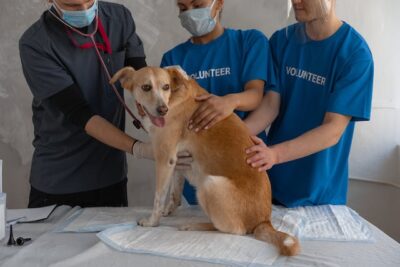
Assessing the Severity of Dog Diarrhea
Monitoring Dehydration Signs
Dehydration is a significant concern during bouts of diarrhea. Watch for signs such as lethargy, dry gums, or sunken eyes, indicating the need for immediate attention. It’s crucial to consider the dog’s stomach condition, overall health, and the potential impact on the gastrointestinal tract.
Recognizing When Veterinary Attention Is Needed
While mild cases can often be managed at home, it’s crucial to recognize signs that require professional veterinary care, ensuring the best outcome for your pet’s health. Monitoring for symptoms like abdominal pain and panting rapidly is essential.
Immediate Actions for Managing Dog Diarrhea
Withholding Food Temporarily
Allowing your dog’s digestive system to settle by withholding food for a short period can aid in recovery. It’s particularly important to consider the dog’s regular food, diet, and any recent changes, such as introducing new food or table scraps.

Ensuring Ample Water Intake
Maintaining proper hydration is crucial during episodes of diarrhea. Ensure your dog has access to fresh water consistently to prevent dehydration and support regular bowel movements. This is particularly important for adult dogs and those dealing with loose stools.
When to Introduce a Bland Diet
A bland diet can help soothe the digestive system when dealing with canine diarrhea. Knowing what to feed a dog with diarrhea and the right time to introduce it is crucial for a smooth transition. Consider options like brown rice and lean protein (such as chicken breast) to create a bland meal.
Canned pumpkin, not pumpkin pie filling, can also be added to the dog’s diet during this period. Ensure a gradual shift to the dog’s regular food after withholding food.
Crafting a Bland Diet for Dogs with Diarrhea
When your furry friend is grappling with digestive distress, crafting a bland yet nourishing diet becomes paramount. Knowing what to feed a dog with diarrhea, these carefully selected options can offer relief without compromising nutritional needs:

Boiled Chicken and Rice
Renowned for being gentle on the stomach, the timeless combination of boiled chicken and rice provides essential nutrients while maintaining digestive equilibrium. This bland food option is often well-tolerated during episodes of upset stomach.
Lean Ground Turkey and Sweet Potatoes
For a nutritious alternative, consider lean ground turkey paired with sweet potatoes. This combination not only offers a balance of lean protein but also introduces fiber for digestive support. It’s a wholesome choice to feed dogs experiencing gastrointestinal sensitivity.
Incorporating Low-Fat Cottage Cheese
Another palatable addition to the bland diet is low-fat cottage cheese. Rich in protein and easy on the stomach, it provides a tasty option for dogs dealing with diarrhea. It’s a great choice to ensure your dog receives the necessary nutrients while being gentle on their digestive system.
Exploring Additional Bland Diet Options
Considering the importance of managing your dog’s stomach health, you can explore other bland diet options to alleviate digestive issues. Plain white rice, boiled hamburger, and canned pumpkin are additional choices known for their mild nature and ability to soothe an irritated stomach.
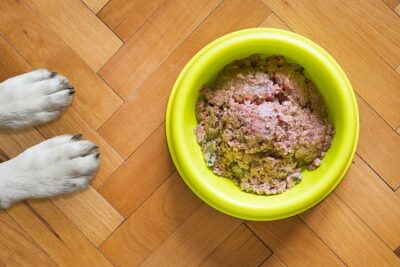
Guidelines for Implementing a Bland Diet
When incorporating a bland diet, it’s essential to follow a few guidelines to maximize its effectiveness:
- Withhold Food Temporarily: During the initial stages of diarrhea, consider withholding food for a short fasting period. This allows the digestive system to rest and recover.
- Feed Dogs Small Meals: Once you reintroduce food, opt for small, frequent meals rather than larger portions. This approach helps prevent overwhelming the digestive system and allows for better digestion.
- Gradual Diet Change: When transitioning back to your dog’s regular food, make the change gradually. Mixing small amounts of the regular diet with the bland food helps avoid abrupt dietary shifts, reducing the risk of loose stools.
- Include Insoluble and Soluble Fiber: For added digestive support, include foods with both insoluble and soluble fiber. Canned pumpkin is an excellent source of soluble fiber, while plain white rice provides insoluble fiber.
- Lean Protein Choices: Stick to lean protein choices like boiled chicken or lean ground turkey. This ensures that your dog receives the necessary nutrients without overloading their system.
By adhering to these guidelines and offering a thoughtfully crafted bland diet, you can navigate your dog’s digestive challenges with care and effectiveness.
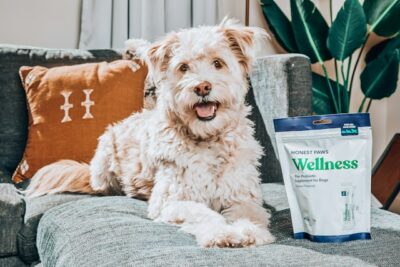
Introducing Probiotics for Digestive Health
In the intricate world of your dog’s gut, probiotics emerge as unsung heroes, contributing to the maintenance of a healthy gut flora. Knowing what to feed a dog with diarrhea, this dynamic balance of microorganisms plays a crucial role in aiding the restoration of equilibrium, especially after episodes of digestive upsets.
Probiotics, often referred to as beneficial bacteria, actively participate in the intricate dance of fostering digestive wellness.
Selecting Appropriate Probiotic Supplements
Not all probiotic supplements are created equal, and choosing the right one for your furry companion is pivotal. The market offers a myriad of options, ranging from various strains to formulations. Opt for a probiotic supplement specifically designed for dogs, ensuring that it includes beneficial strains that align with your dog’s digestive needs. This thoughtful selection enhances the effectiveness of the supplement in promoting digestive health.
Complementary Support with Fiber Supplement and Easily Digestible Starches
In tandem with probiotics, providing additional support through fiber supplements and easily digestible starches can further bolster your efforts in promoting a healthy digestive system. Fiber supplements contribute to overall gut health by supporting regular bowel movements and maintaining digestive regularity. Easily digestible starches, such as cooked rice or sweet potatoes, serve as gentle additions that complement the probiotics’ work, offering a well-rounded approach to digestive support.

Hydration Strategies for Dogs with Diarrhea
Ensuring your canine companion’s well-being during bouts of diarrhea involves not only dietary considerations but also strategic hydration practices. Let’s delve into the importance of maintaining hydration and explore effective strategies to navigate this challenging period.
Importance of Maintaining Hydration
In the intricate dance of your dog’s digestive system, hydration takes center stage. Adequate water intake is not only crucial for overall health but becomes particularly critical during episodes of diarrhea. Diarrhea can lead to fluid loss, potentially causing dehydration. Monitoring your dog’s water consumption and taking proactive measures to ensure they stay well-hydrated is fundamental to the recovery process.
Electrolyte Solutions for Rehydration
In instances of severe diarrhea, your dog may lose essential minerals along with fluids. Electrolyte solutions, designed for rehydration, play a vital role in replenishing these lost minerals. These solutions are formulated to provide a balance of electrolytes, aiding in the restoration of your dog’s internal equilibrium. However, it’s advisable to consult with your veterinarian before introducing any specific electrolyte solution to your dog’s regimen.
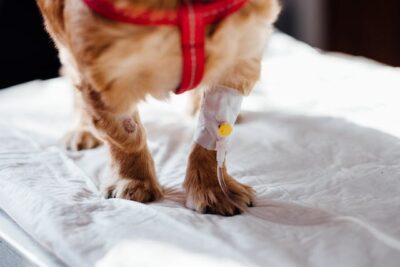
Gradual Transition to Regular Dog Food
Monitoring Stool Consistency
As your dog progresses through the recovery phase, monitoring stool consistency becomes a guiding factor for reintroducing a regular diet. The transition should be gradual, allowing your dog’s digestive system to adapt to the reintroduction of regular food components. Consistent monitoring ensures that the digestive process normalizes, reducing the risk of a recurrence of diarrhea.
Reintroducing Regular Diet Components Gradually
The reintroduction process involves a thoughtful and gradual approach. Begin by reintroducing small portions of your dog’s regular diet and observe their response. If stool consistency remains normal and there are no signs of digestive discomfort or other symptoms, you can continue to reintegrate other components gradually.
Guidelines for Managing Diarrhea in Dogs
- Consult Your Vet: Persistent or severe cases of diarrhea warrant veterinary attention. If your dog experiences diarrhea for more than a day or exhibits other concerning symptoms, consult your vet promptly.
- Consider Age Factors: Senior dogs may have different dietary needs, and the best foods for managing diarrhea can vary. Be mindful of your dog’s age and tailor their diet accordingly.
- Small, Frequent Meals: Instead of regular feeding schedules, consider offering small, frequent meals. This approach is gentler on your dog’s system, minimizing the strain on their digestive tract.
- Avoid Sudden Changes: Abrupt changes in your dog’s diet can contribute to digestive upset. Maintain consistency in their regular feeding routine and avoid introducing new foods without proper consideration.
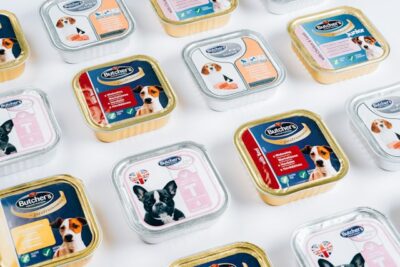
Commercial Dog Foods for Sensitive Stomachs
Navigating the myriad options of commercial dog foods becomes crucial when addressing the dietary needs of dogs with sensitive stomachs, especially when considering what to feed a dog with diarrhea. Let’s delve into specialized brands and limited ingredient diets, as well as explore dietary supplements aimed at promoting gut health.
Reviewing Specialized Brands
When it comes to commercial dog foods tailored for sensitive stomachs, a careful review of specialized brands is essential. Consider examining the ingredients and nutritional content of these brands, ensuring they align with the dietary requirements for dogs experiencing digestive issues. Specialized formulations often feature easily digestible components, contributing to improved gastrointestinal health.
Examining Limited Ingredient Diets
Limited ingredient diets, designed with a focus on simplicity, can offer significant benefits for dogs with known food sensitivities. These diets typically feature a short list of carefully selected ingredients, minimizing the potential for triggering digestive sensitivities. Exploring and understanding the offerings within the realm of limited ingredient diets provides dog owners with valuable options for promoting digestive wellness.

Dietary Supplements for Gut Health
Omega-3 Fatty Acids
Incorporating omega-3 fatty acids into your dog’s diet can be a proactive step toward supporting overall health, including the digestive system. These essential fatty acids offer anti-inflammatory effects, contributing to a balanced and resilient gastrointestinal tract. Common sources include fish oil supplements, providing a palatable means to enhance your dog’s nutrient intake.
Slippery Elm for Soothing the Digestive Tract
For a natural approach to soothing the digestive tract, consider the benefits of slippery elm. This herbal supplement has been recognized for its gentle and supportive effects on the gastrointestinal system. Whether in the form of a supplement or a properly prepared herbal remedy, slippery elm can be a valuable addition to your dog’s regimen, aiding in digestive comfort.

When to Consult a Vet for Dog Diarrhea
Persistent or Severe Cases
While proactive home care is valuable, it’s crucial to recognize when veterinary intervention is necessary. If your dog’s diarrhea persists or worsens despite home care measures, seeking professional consultation is paramount. Persistent or severe cases may indicate an underlying cause that requires thorough evaluation and treatment.
Necessary Diagnostic Tests
Veterinarians may recommend various diagnostic tests to identify the root cause of persistent diarrhea. These tests can include fecal examinations, blood tests, and imaging studies. Understanding the diagnostic process helps dog owners make informed decisions about their pet’s health.

Summary of Key Points
Importance of Timely and Appropriate Diet
Timely intervention with an appropriate diet is a cornerstone of managing and preventing recurrent episodes of diarrhea in dogs. Understanding your dog’s individual dietary needs and responding promptly to digestive issues contribute to their overall well-being.
Balancing Nutrient Intake for Recovery
Maintaining a balanced nutrient intake plays a pivotal role in supporting your dog’s overall health and aiding in a faster recovery process. As you navigate dietary options, consider the specific nutritional requirements of your dog, promoting a holistic approach to their well-being.
FAQs: What to Feed a Dog with Diarrhea
- Q1: Why is my dog’s stomach sensitive to certain foods?
- A: Dogs can have sensitivities or allergies to specific ingredients in their food, leading to digestive issues like diarrhea. Identifying and avoiding trigger ingredients is crucial for maintaining a healthy stomach.
- Q2: Can I continue feeding my dog’s regular food during diarrhea episodes?
- A: It’s advisable to withhold your dog’s regular food temporarily when they have diarrhea. Transitioning to a bland food helps soothe the stomach and facilitates easier digestion.
- Q3: Are there specific dog food brands for dogs with sensitive stomachs?
- A: Yes, many dog food brands offer specialized formulations for sensitive stomachs. Reviewing ingredients and choosing brands with easily digestible components can contribute to better gastrointestinal health.
- Q4: How long should I withhold food when my dog has diarrhea?
- A: Withholding the dog’s food for 12-24 hours can give the digestive system a rest. After this fasting period, gradually reintroduce a bland diet in small meals to monitor tolerance.
- Q5: What to feed a dog with diarrhea during the recovery period?
- A: Bland foods like boiled chicken and rice or lean ground turkey with sweet potatoes are gentle on the stomach and help restore normal bowel movements during recovery.
- Q6: Is diarrhea in dogs a medical emergency?
- A: While most cases of diarrhea can be managed at home, persistent or severe diarrhea, especially accompanied by other symptoms, may indicate a medical emergency. Consult your vet promptly.
- Q7: Can I give my dog small meals if they have diarrhea?
- A: Yes, offering small, frequent meals during recovery is beneficial. This approach helps prevent overloading the digestive system and supports a gradual return to normal feeding.
- Q8: Will my dog’s experience with diarrhea be similar to other dogs?
- A: Each dog is unique, and their response to dietary changes or digestive issues may vary. Pay attention to your dog’s specific needs and consult your vet for personalized guidance.
- Q9: Can I feed my dog other foods when they have diarrhea?
- A: It’s best to stick to a prescribed bland diet during recovery. Introducing other foods too soon may disrupt the healing process and lead to a recurrence of diarrhea.
- Q10: As a dog owner, what signs should I look for in my dog’s overall health during diarrhea recovery?
- A: Monitor for signs of dehydration, changes in behavior, and the gradual return of normal bowel movements. If you notice any concerning symptoms, consult your vet for further evaluation.

Conclusion: What To Feed A Dog With Diarrhea
In conclusion, when it comes to navigating the intricacies of what to feed a dog with diarrhea, it involves a thoughtful approach. By understanding the causes, assessing severity, and implementing a tailored diet, you can significantly contribute to your furry companion’s health and happiness.
For those in Georgia looking for puppies, consider checking out our listings, we have for a variety of puppies for sale in Georgia. Remember, your proactive care makes all the difference in your dog’s well-being. For more valuable information on dog care, tips, and insights into different breeds, visit our blog page.




